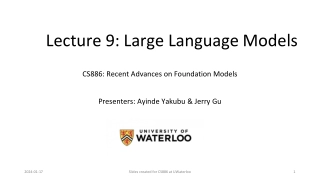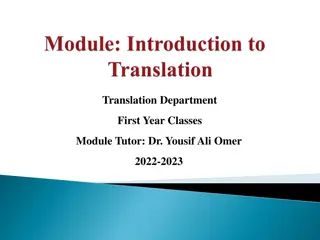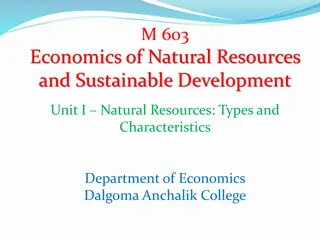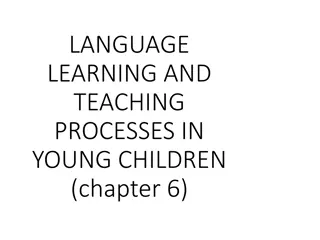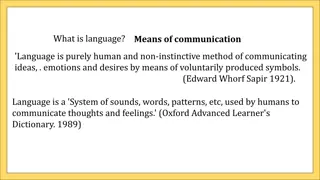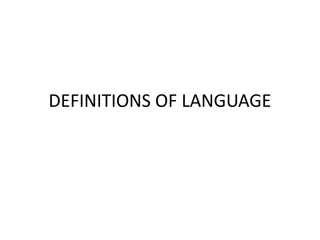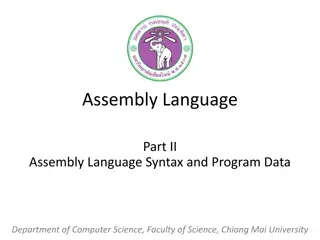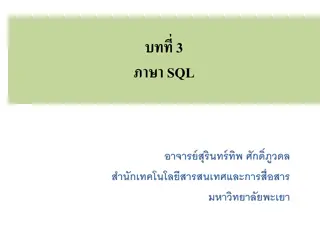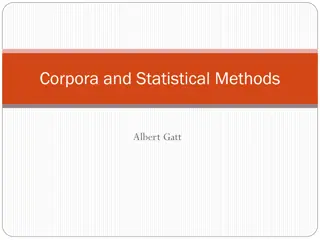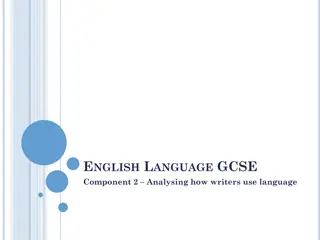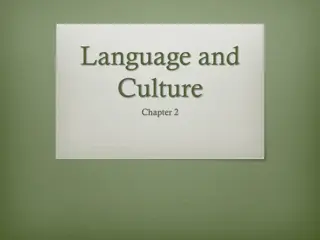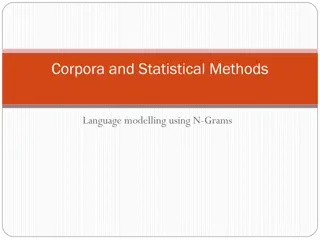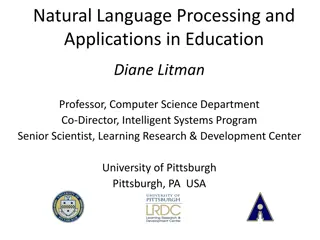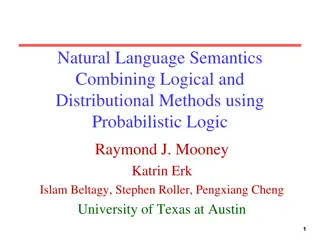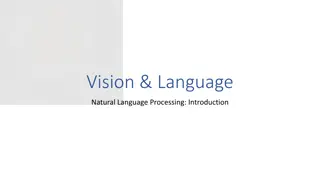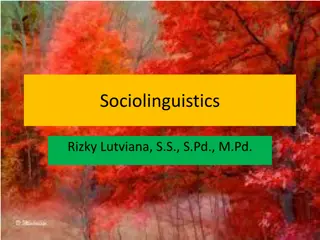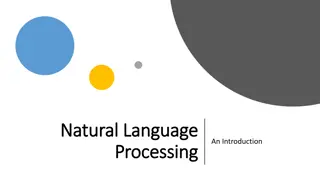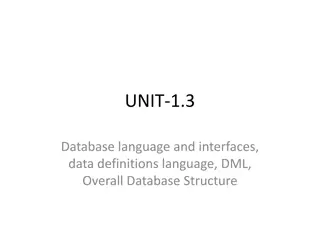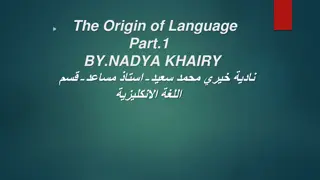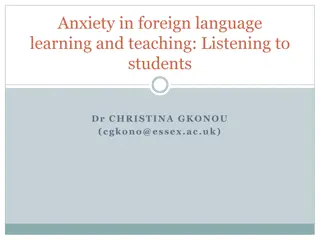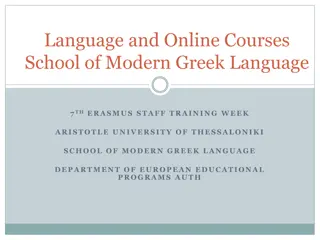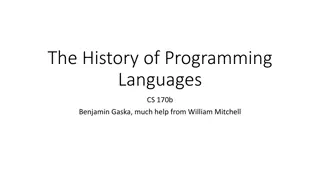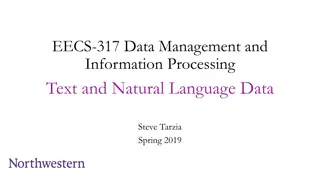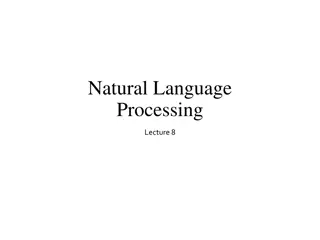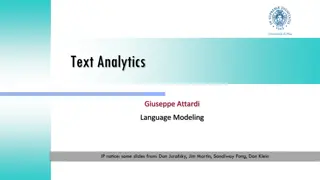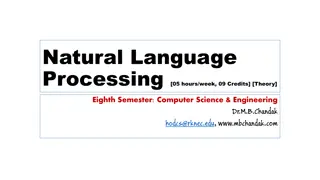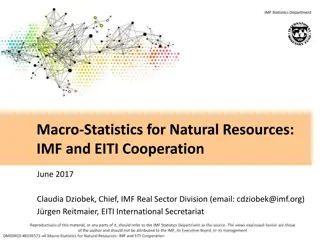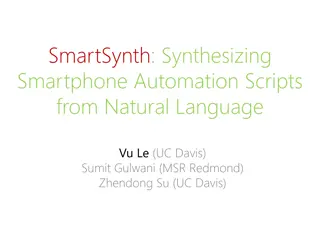Career Opportunities and Challenges in Translation & Interpreting Pedagogy Post-Pandemic
The APTIS 2022 conference explores new avenues in Translation and Interpreting (T&I) pedagogy amidst a changing landscape. Dr. Bego A. Rodriguez highlights emerging roles for T&I graduates. The context reveals a decline in language learning in the UK, impacting the Language Service Industry. The UK'
1 views • 13 slides
Recent Advances in Large Language Models: A Comprehensive Overview
Large Language Models (LLMs) are sophisticated deep learning algorithms capable of understanding and generating human language. These models, trained on massive datasets, excel at various natural language processing tasks such as sentiment analysis, text classification, natural language inference, s
3 views • 83 slides
Language Study Community – Enhance Your Language Skills
Joining a Language Study Group is a fantastic way to take your language learning to the next level. By leveraging the power of Group Study, you can immerse yourself in the language, enhance your understanding, and build confidence in your speaking abilities. Read full article \/\/explainlearning.com
1 views • 3 slides
Academic Language Demands and Supports in Instructional Planning
Academic Language Demands and Supports are crucial in educational settings to ensure comprehension and usage of language by students. This content discusses embedding language demands in lesson plans, providing language supports, and peer review activities to enhance academic language skills. The fo
6 views • 10 slides
The Significance of Media in Language Learning
Media plays a crucial role in language learning by raising awareness of the ideology behind linguistic structures and providing valuable information on society and culture. Linguists are drawn to media language for research purposes and to understand its impact on language use and attitudes. Media s
12 views • 5 slides
Translation: Key Concepts and Definitions
Translation involves transferring written text from one language to another, while interpreting deals with oral communication. Etymologically, the term "translation" comes from Latin meaning "to carry over." It is a process of replacing an original text with another in a different language. Translat
12 views • 76 slides
Language and Communication in Society: Understanding Interactions
Explore the intricate relationship between language and society through lectures focusing on language in interaction, power dynamics, language contact and change, public space discourse, linguistic landscaping, and more. Delve into the shift from structural linguistics to societal communication, red
6 views • 28 slides
Natural Resources and Resource Economics
Economics of natural resources focuses on the supply, demand, and sustainable allocation of the Earth's resources. It aims to develop a sustainable economy that protects natural resources for future generations. Natural resources are essential for human survival and include biotic and abiotic resour
1 views • 11 slides
The Best Odie's Natural Oil for Enhancing Wood Furniture Beauty
Wood furniture has a timeless appeal, adding warmth and elegance to any space. To maintain and enhance its beauty, using the right oil finish is crucial. Among the various products available, Odie\u2019s Natural Oil stands out as one of the best natural oils for wood furniture. This blog will delve
2 views • 4 slides
Language Learning and Teaching Processes in Young Children
Development of language in young children is influenced by various factors such as their cultural and linguistic environment, unique characteristics, and interactions with adults. Optimal language development requires language stimulation from the environment. Varied cultural practices impact langua
1 views • 51 slides
Language: An Overview of Linguistics
Linguistics is the scientific study of language, a complex system of sounds, words, and patterns that humans use to communicate thoughts and feelings. Language consists of phonology (sounds), morphology (words), syntax (sentences), semantics (meaning), and pragmatics (contextual meaning). Different
0 views • 42 slides
Various Definitions of Language Throughout Linguistic History
Different linguists and scholars have offered various definitions of language over time. Sapir (1921) emphasized language as a method of communicating ideas, emotions, and desires through voluntary symbols. Bloch and Trager (1942) focused on the social aspect of language as a system of vocal symbols
2 views • 12 slides
Introduction to Assembly Language Syntax and Program Data
Learn about the syntax of assembly language and how data, variables, and constants are used in programming. Explore the basic instructions and the translation of high-level language into assembly language. Discover the role of an assembler in translating assembly language programs into machine langu
5 views • 36 slides
Enhancing Language Learning Across the Curriculum in B.Ed. 1st Year Course
Language Across the Curriculum (LAC) emphasizes that language learning should occur across all subjects, not just in language classrooms. It highlights the importance of incorporating language development into every learning activity, fostering multilingualism in schools. Language plays a crucial ro
3 views • 34 slides
Comprehensive Overview of SQL Commands and Language Categories
In this detailed guide, you will learn about Structured Query Language (SQL) including its various commands such as Data Definition Language (DDL), Data Manipulation Language (DML), Data Control Language (DCL), and Transaction Control Language (TCL). Explore how SQL is used in Database Management Sy
0 views • 15 slides
Introduction to Corpora and Statistical Methods in Natural Language Processing
This course, CSA5011, delves into statistical natural language processing, covering language formalization, Java as an artificial language, natural language complexity, and levels of analysis in phonetics, morphology, syntax, and semantics.
1 views • 34 slides
Speech and Language Developmental Milestones: A Bilingual/Multilingual Perspective
Speech and language developmental milestones are crucial for children, regardless of their home language. These milestones encompass receptive language, expressive language, pragmatics, and articulation and phonology. Understanding how a child hears and talks from birth to one year is essential, as
2 views • 23 slides
Analyzing Writer's Language Use in English Language GCSE Component 2
In English Language GCSE Component 2, students learn to analyze how writers use language. The learning objective focuses on commenting, explaining, and analyzing language use with relevant subject terminology. The exam assesses students on their ability to interpret and explain a writer's thoughts,
0 views • 12 slides
Language and Culture Reflections: Diversity in Linguistic Emphasis
Exploring the correlation between language and culture, this content delves into how various languages reflect cultural values and priorities. Through examples like the Inuit language with rich vocabulary for snow and seals, the Shinzwani culture's unique word for mother and aunt, and the evolving l
1 views • 50 slides
N-Gram Models in Language Modelling
N-gram models play a crucial role in language modelling by predicting the next word in a sequence based on the probability of previous words. This technology is used in various applications such as word prediction, speech recognition, and spelling correction. By analyzing history and probabilities,
0 views • 101 slides
Natural Language Processing in Education: Overview and Applications
Natural Language Processing (NLP) plays a crucial role in education by enabling computers to understand and generate human language. NLP is essential due to the abundance of machine-readable text, audio, and video data available today, leading to the development of conversational agents like Siri an
0 views • 92 slides
Natural Language Semantics: Combining Logical and Distributional Methods
Explore the integration of logical and distributional methods in natural language semantics, including the use of probabilistic logic, FOPC, Montague Semantics, semantic parsing, and more. Delve into the rich representation of knowledge, semantic compositionality, and the mapping of natural language
1 views • 43 slides
Challenges in Natural Language Processing Explained
Natural Language Processing (NLP) involves automatic reasoning over text, presenting unique challenges like understanding language nuances and complexities. This introductory overview delves into the fundamentals of NLP, highlighting common tasks such as language modeling and ML representations. Del
4 views • 59 slides
Introduction to Language Technologies at Jožef Stefan International Postgraduate School
This module on Knowledge Technologies at Jožef Stefan International Postgraduate School explores various aspects of Language Technologies, including Computational Linguistics, Natural Language Processing, and Human Language Technologies. The course covers computer processing of natural language, ap
0 views • 27 slides
Sociolinguistics: Language Variation and Social Factors
Sociolinguistics delves into the study of language variation influenced by social factors, examining the relationship between language and its social context. It explores various aspects like standard pronunciation, language choice, speech acts, language components, language variety, and factors suc
0 views • 73 slides
Introduction to Natural Language Processing
Natural Language Processing (NLP) is a field that focuses on enabling computers to understand, interpret, and generate human language. It involves tasks such as machine translation, information extraction, text summarization, dialogue systems, tagging, and speech recognition. NLP presents challenges
0 views • 26 slides
Assembly Language Programming for Computing Layers
Assembly language is a low-level programming language that enables direct interaction with a computer's hardware components. This content explores the fundamentals of assembly language, the relationship between human-readable machine language and binary code, an assembly language program for multipl
1 views • 31 slides
Database Language and Interfaces Overview
A database management system (DBMS) requires appropriate languages and interfaces to handle queries and updates for data manipulation and control. This includes Data Definition Language (DDL), Data Manipulation Language (DML), Data Control Language (DCL), and Transaction Control Language (TCL). Each
2 views • 12 slides
The Origins of Language: Divine, Natural, and Experiential Sources
Delve into the fascinating exploration of the origins of language, examining theories including divine origins as gifts from gods, natural sound sources through onomatopoeia, genetic influences, and experimental attempts to uncover language's beginnings. Discover intriguing insights into the diverse
0 views • 8 slides
Language Anxiety in Foreign Language Learning and Teaching
Explore the impact of language anxiety on students and teachers in foreign language learning and teaching contexts through insights from Dr. Christina Gkonou's research. Delve into the theoretical background, implications for language education, and real-life experiences shared at the Essex Language
0 views • 25 slides
Strengthening Language Rights: Official Languages (Amendment) Act 2021
The Official Languages (Amendment) Act 2021, enacted to strengthen the language rights of Irish speakers, introduces provisions for public bodies' communications in official languages. Section 10A requires public bodies to allocate a minimum of 20% of advertising in Irish and 5% of ad expenditure in
0 views • 49 slides
School of Modern Greek Language: Courses, Seminars, and Assessment Overview
Explore the School of Modern Greek Language at Aristotle University of Thessaloniki offering language courses, seminars for teachers, and assessment exams. Founded in 1970, the school provides a multicultural environment for students worldwide, emphasizing Greek culture and offering a variety of lan
0 views • 17 slides
Insights into the World of Programming Languages
Explore the fascinating realm of programming languages, from their fundamental definition as systems for computation to the diverse range of language designs that reflect different perspectives on the world. Learn about the essential characteristics that make a language Turing Complete, discover the
0 views • 15 slides
Natural Language Generation (NLG) Process
Natural Language Generation (NLG) is the process of constructing natural language outputs from non-linguistic inputs. It involves generating text from machine representations to meet specific communicative goals. NLG is distinct from Natural Language Understanding (NLU) as it maps meaning to text, w
0 views • 38 slides
Natural Language Data Processing
Exploring aspects of natural language data, covering topics like the differences between natural and formal languages, challenges in processing natural languages for machines, and examples of dealing with natural language data such as Yelp reviews. The content also touches on big data concepts, hash
0 views • 26 slides
Advanced Smoothing Algorithms in Natural Language Processing
Dive into the world of advanced smoothing algorithms like Good-Turing, Kneser-Ney, and Witten-Bell used in Natural Language Processing. Explore concepts such as Good-Turing Smoothing Intuition, Unigram Prior Smoothing, and more general formulations for better language modeling through statistical te
0 views • 21 slides
Language Modeling and Its Importance in Natural Language Processing
Language modeling plays a crucial role in various NLP tasks such as speech recognition, machine translation, spell correction, and more. It involves assigning probabilities to sequences of words or predicting the likelihood of a word given its context. The Chain Rule of Probability is applied to com
0 views • 76 slides
Comprehensive Course on Natural Language Processing
This eighth-semester course in Computer Science & Engineering covers the fundamentals of Natural Language Processing (NLP) including basics, modeling techniques, syntactic and semantic parsing, information extraction, and machine translation. Prerequisites include knowledge of English grammar, theor
1 views • 16 slides
IMF Statistics Department - Natural Resources Statistical Tools
IMF Statistics Department has developed two statistical tools, the Revenue Template and National Accounts Template, to help countries analyze government revenues and natural resources in national accounts. These tools are crucial for policymaking in countries heavily reliant on natural resource reve
1 views • 9 slides
SmartSynth: Synthesizing Smartphone Automation Scripts from Natural Language
SmartSynth is a cutting-edge project by Vu Le, Sumit Gulwani, and Zhendong Su that aims to automate smartphone tasks by converting natural language instructions into executable scripts. The project involves programming in Java and C#, utilizing tools like Tasker and App Inventor to create automation
0 views • 31 slides

